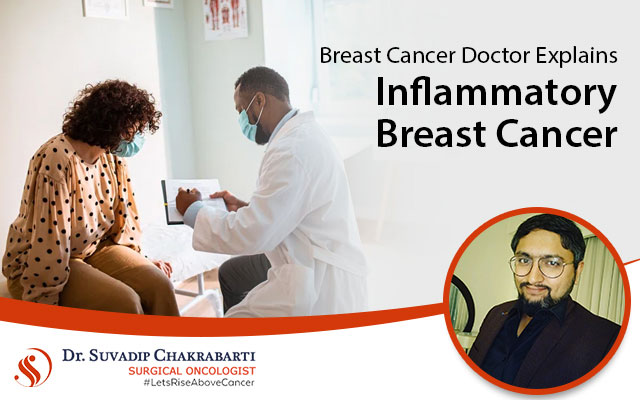What is inflammatory breast cancer (IBC)?
Inflammatory breast cancer (IBC) is rare and sometimes considered some form of infection. However, this sort of cancer can develop and spread swiftly (considered to be aggressive). It causes redness, swelling and dimpling in the afflicted breast. IBC does not generally cause lumps to develop in breast tissue. Instead, it shows as a rash or skin texture similar to an orange peel, says Dr Suvadip Chakrabarti, a breast cancer surgeon in Kolkata.
Because IBC may grow fast, it demands prompt treatment. Doctors commonly treat IBC with medications, including chemotherapy, surgery and radiation therapy.
What causes inflammatory breast cancer (IBC)?
Inflammatory breast cancer arises when cancer cells obstruct lymph arteries. These hollow tubes allow lymph fluid to flow out of the breast.
In most cases of IBC, cancer cells migrate outward (metastasize) from lymph vessels. When cancer metastasizes, it affects the skin and other organs and is more difficult to cure.
What are the signs of inflammatory breast cancer (IBC)?
Symptoms of IBC generally take just 3-6 months to emerge, says the breast cancer doctor in Kolkata. Your symptoms may include:
- A red or purple tint or a rash extending over one-third of the breast
- Inverted or retracted nipple
- Pain, swelling, itchiness, burning, or tenderness
- Sensations of warmth or heaviness within the breast
- Increase in the size of one breast only
- Swollen lymph nodes near the collarbone or under the arm
How is inflammatory breast cancer (IBC) diagnosed?
Lumps frequently do not develop in inflammatory breast cancer, making the illness tougher to identify.
Your doctor diagnoses IBC based on your symptoms, a physical examination and test results. In some cases, doctors rule out other issues that may cause similar symptoms, like breast tissue infections (mastitis). Your doctor may prescribe antibiotics to treat a suspected infection. Inform your doctor promptly if antibiotics fail to alleviate your symptoms, says the doctor of breast cancer surgery in Kolkata.
Your doctor will obtain a tissue sample (biopsy) for laboratory study to confirm your diagnosis. Your doctor will use the biopsy data to stage cancer and determine if it has spread outside the breast tissue. Biopsies can assist doctors in determining if certain cancer cells may benefit from targeted medicines such as hormone therapy.
Additionally, your doctor may prescribe one of the following tests to check if IBC has spread to other tissues:
Mammogram
A screening test that uses low-energy X-rays to generate an image of the breast’s interior.
Ultrasound
Sound waves provide images of the breasts inside.
Positron emission tomography (PET scan)
Examines interior structures and detects illness by utilizing dye containing radioactive medicines.
Computed tomography (CT scan)
Constructs a cross-sectional picture of the breast by combining multiple X-rays.
Magnetic resonance imaging (MRI)
This imaging technology uses radio waves, magnets and a computer to create images of the internal structures and processes of the body.
For more details, consult Dr Suvadip Chakrabarti, a breast cancer surgeon in Kolkata.


